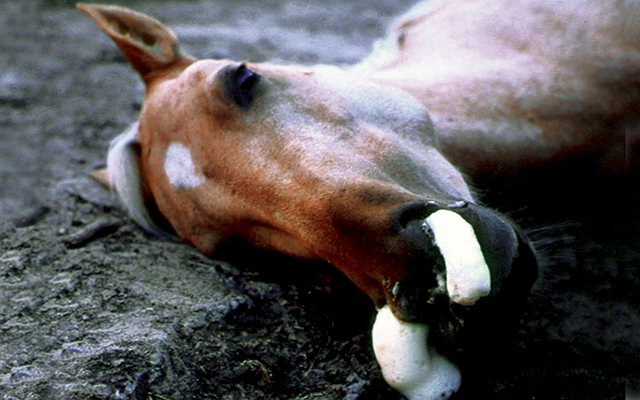Government and equestrian industry are working together to try to ensure Britain’s herd is protected should African horse sickness (AHS) arrive. But there is a great deal of work to do.
Defra’s exotic disease control team organised a session on 14 May to set out current contingency plans for an outbreak, in Britain or a neighbouring country, and to gather the thoughts of stakeholders from across the industry. One key theme was how to get the right messages to the right people, at the right time.
“While the risk to the UK remains remote, African horse sickness is one of the most impactful animal diseases and is one of four listed in the National Risk Register,” a Defra spokesperson told H&H. “Preparedness is therefore key and this stakeholder meeting was the first in the Government’s disease exercise planning for AHS. Future work will look at disease control measures, vaccination and recovery.”
The Defra control strategy’s aim is to “identify any suspect cases of AHS as quickly as possible, to identify the source of the disease, and to minimise spread of the disease and lead the country back to disease-free status”.
AHS is a midge-borne virus that affects all equids and has a 55–95% mortality rate in horses. It is endemic in sub-Saharan Africa; there have been no recorded cases in Britain, but there are concerns that increasing temperatures will benefit the insects that transmit some exotic diseases.
Bluetongue virus, which wreaks havoc in sheep, and has reestablished itself in northern Europe and was spreading in England last year, is closely related to AHS.
Helen Roberts, policy lead for non-livestock diseases, risk and science at Defra, covered the Government’s strategy. She explained that the most recent countries outside Africa to have AHS are Malaysia and Thailand, within the past five years.
“The Thai outbreak was because of the movement of zebras from South Africa, and the Malaysian one we think was down to the use of vaccine rather than live animal movements,” she said. “So it’s important to remember this can still turn up in countries you don’t expect it to, so we do continue to monitor it. AHS is on our National Risk Register because it would potentially have such a high impact if we have an outbreak in this country.”
Action will also be taken if there is an outbreak close enough in mainland Europe to put the UK at risk, as “plumes” of midges could be carried here by winds. Dr Roberts stressed that alertness and rapid action is key. Measures in the control strategy include visits to premises by official vets, testing, imposing movement restriction zones – which cover up to a 150km radius, so would apply if the disease was in some parts of Europe – and protecting horses from midges as for sweet itch.
Dr Roberts explained that AHS is closely monitored internationally so any increased risk would be reported on the Government website, but that the key is getting the right messaging out.
“We don’t just want to send out a message to everybody saying, ‘This is Government. You need to stop doing this immediately and do this instead,’” she said. “It’s got to show the benefits to people of why we’re wanting to change their behaviour, what barriers there might be to behavioural change and if we can understand that now, we can find the best way to deal with it.”
Stakeholders stressed the importance of consistent messaging and suggested text alerts, local media and devolved government websites as key for a unified message.
Concerns raised by stakeholders included the plausibility of containing semi-feral ponies, such as in the New Forest or on Dartmoor, and the challenges of communicating with their owners when many do not use email, which Dr Roberts said was “exactly the sort of thing we want to raise” in moving the strategy on.
Another key, as pointed out by British Equine Veterinary Association CEO, and British Horse Council chair, David Mountford, is the need to know exactly where horses are in the event of increased risk of disease.
“Let me get on my hobby horse again,” he said. “There is a Central Equine Database which, if enabled properly through a statutory instrument and applied, could be a way to access all registered horse owners via a mobile device or email. That statutory instrument has stalled in Government at the moment, but with it, we can do an awful lot. Without it, we’re severely restricted.
“It’s in place in Canada; you can see it giving the ability to disseminate rapid information, on disease outbreaks, to owners across the territory. Very quickly and very effectively, getting a single message, which we are not able to do. We’re missing out.”
- To stay up to date with all the breaking news from major shows throughout 2025, subscribe to the Horse & Hound website
You may also be interested in:

African horse sickness – are horses in the UK at risk? *H&H Plus*
As midges spread a deadly equine virus through Thailand, Professor Debra Archer MRCVS discusses the risk of a UK outbreak

African Horse Sickness: why a British outbreak would be deadly *H&H VIP*
Could the midges responsible for the deadly disease African horse sickness ever reach our shores? Matthew Robin MRCVS explains why

‘Is there horse meat in your lasagne? Don’t know’: equestrian industry’s warning to Government

Subscribe to Horse & Hound magazine today – and enjoy unlimited website access all year round




